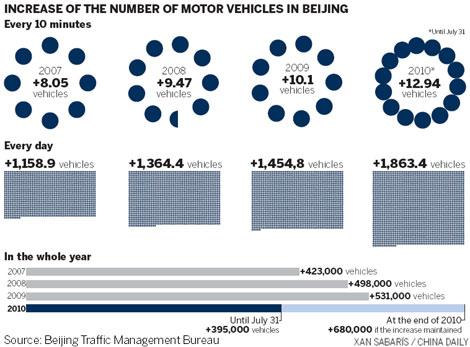With congestion now part of daily life in the capital and the number of vehicles growing exponentially every week, the debate about whether congestion fees are the answer has again been sparked.
The latest statistics from the Beijing Traffic Management Bureau show that, as of Aug 1, the capital's population of motor vehicles stood at 4.4 million.
In July alone, the number went up by 52,000 and in the last week of July, a stunning 13,000 more vehicles joined the traffic line-ups.
Along with the increase in motor vehicles, the use of bicycles, once the major vehicle in China, has reportedly decreased from 38 percent in 2000 to 18 percent in 2009. The sharp rise in the number of cars in the capital has led to a daily five-hour traffic jam, according to Xinhua Daily Telegraph.
A resident originally from South Africa suggested during a meeting for collecting suggestions for Beijing's 12th five-year development plan that Beijing follow London's lead in charging a congestion fee in a bid to limit the number of cars entering the city's core.
The idea has been mentioned before. A recent report by the Chinese People's Political Consultative Conference Beijing Committee also proposed a congestion fee and provided statistics backing the call.
In London, drivers were charged 8 pounds to take their cars into the downtown area between 7 am and 6 pm on working days.
The center of London saw an immediate reduction of 60,000 autos after the policy was introduced, according to a report by the London Development Agency Beijing Representative Office.
But to many in Beijing, the idea of a congestion fee is roundly criticized with technological inadequacy being one of the reasons.
In London, drivers are charged mainly though an electronic toll collection system (ETC) which directly deducts money from accounts affiliated with car registration. But, in Beijing, the way in which the fees might be collected remains a question.
Some highways in Beijing have installed the ETC system, but few drivers have signed up, said Yang Hongshan, an urban planning professor at Renmin University of China.
"Moreover, it'll be even harder to require cars from outside Beijing to install the system for that one policy," he added.
But regardless of technological challenges, critics also argue that Beijng's public transportation will not be able to cope with the anticipated demands if such a toll is introduced.
Congestion fees in London only worked because there was adequate public transportation, said Colin Friedman, an expatriate from London who has lived in Beijing for more than five years.
He is in favor of congestion fees, but only after new subway lines in Beijing are completed.
London has a highly concentrated subway network with easily accessible stations suffusing the city and an advanced transfer system allowing quick shifts between lines.
So when from 15 to 25 percent of former drivers turned to the subways and buses, the city's advanced public transportation system was able to absorb them.
Considering that, professor Yang said: "Above all, Beijing should first develop its public transportation system, especially its subways."
Yang said in the meantime Beijing citizens should develop their mindsets too.
"Car owners should realize taking the subway is not a disgraceful thing," he said. "Part of a metropolitan spirit is the awareness of the need to use public transportation."
But, in a bid to beat the gridlock, some people have even abandoned the idea of public transportation and resorted to the old-fashioned bicycle.
"I say, if you have a problem with the traffic or the idea of a congestion charge, hop on your bike," said Rob Hennebry, a restaurant manager from Ireland who uses a bike as his primary mode of transportation.
"My personal view is that if you drive a car in a congested city, you are an idiot and if you drive a car in a city that's polluted, you are making yourself look worse," he said.
William Axford and Todd Balazovic contributed to the story.






